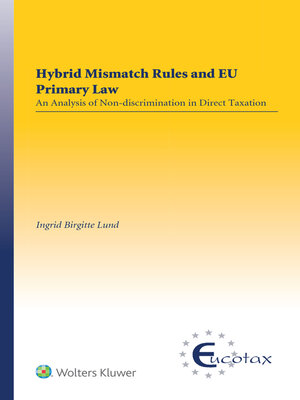Hybrid Mismatch Rules and EU Primary Law
ebook ∣ An Analysis of Non-discrimination in Direct Taxation · EUCOTAX Series on European Taxation
By Ingrid Birgitte Lund

Sign up to save your library
With an OverDrive account, you can save your favorite libraries for at-a-glance information about availability. Find out more about OverDrive accounts.
Find this title in Libby, the library reading app by OverDrive.



Search for a digital library with this title
Title found at these libraries:
| Library Name | Distance |
|---|---|
| Loading... |
EUCOTAX Series on European Taxation
Hybrid mismatch rules, as enacted based on Articles 9, 9a, and 9b of the EU Anti-Tax Avoidance Directive (ATAD), obligate Member States to alter the tax treatment for cross-border transactions in order to prevent non-taxation or double non-taxation which may occur when a transaction is not only deductible for the payer but also deductible or not taxed as income for the payee. This book explores whether the transposed national hybrid mismatch rules adopted under the ATAD infringe on taxpayers' right to free movement under the fundamental freedoms and clarifies the extent of the protection these freedoms afford in direct tax cases.
The author's far-reaching analysis extends to such considerations as the following:
why hybrid mismatches arise;
scope of application of the hybrid mismatch rules and the conditions for them to apply;
whether the EU has the legal competence to enact hybrid mismatch rules;
assessment of the hybrid mismatch rules under the CJEU-developed discrimination test; and
whether the general abuse of law principle serves as an exception to the taxpayer's reliance on fundamental freedoms.
Recognizing the tension in international tax law between competition and cooperation – including the extent to which a taxpayer covered by the hybrid mismatch rules, by invoking the fundamental freedoms, can claim the benefits that hybrid mismatch rules deprive them of – the answers and clarifications in this deeply informed book contribute to foreseeability and legal certainty for both corporations and governments. With it as a guide, both practitioners and policymakers will ensure appropriate application of hybrid mismatch rules, develop a keen awareness of how these rules affect taxpayers and their right to free movement and understand how the fundamental freedoms may be invoked as taxpayer protection.







